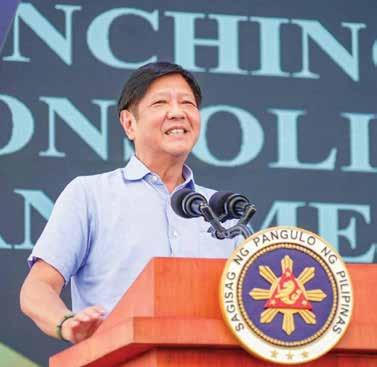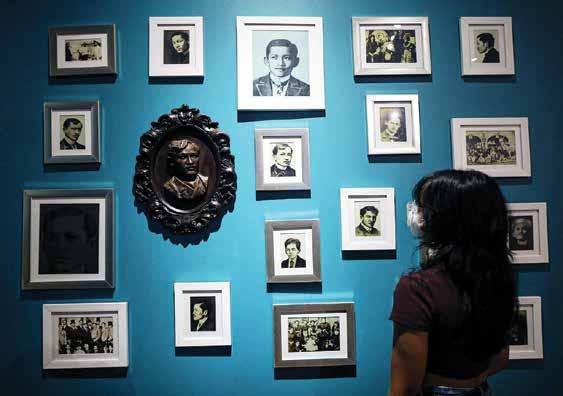
4 minute read
No place for fake news in...
all of us do around the world,” he said.
‘Serious problem’
Advertisement
Fake news has been widely regarded as an undermining factor in public discourse and news reporting here and overseas.
A survey by the Social Weather Stations in February 2022 showed 69 percent of its respondents saying that fake news was a “serious problem” in the country.
In 2017, a University of Oxford study found that the camp of then-President Rodrigo Duterte spent $200,000 — or about P10 million — for his social media campaign during the 2016 presidential race.
U.S.-based rights group Freedom House said also in 2017 that the Duterte administration was operating fake social media accounts to attack its critics, employing what it called “a keyboard army.”
Duterte himself admitted that year that he paid “trolls,” but only during the 2016 campaign. His administration would be hounded by accusations that it exploited fake news—such as in 2021 when the Senate sought an inquiry into reports that state funds were being used for fake news operations. In the 2022 election campaign, then-presidential candidate Ferdinand Marcos Jr. said he was offered troll farms to boost his campaign, but said he did not avail himself of this. “We have no trolls. None. Not a single one. I have been offered a click army. I’ve been offered a troll. I did not use it,” he told CNN in an interview at that time.
Tsek.ph, an academebased fact-checking initiative, said in February that year that Marcos had become a beneficiary of misleading social media messaging, while Twitter suspended hundreds of accounts allegedly linked to his supporters for violating its rules.
FOI policy
Despite accusations against Duterte and Marcos that they benefited from social media propaganda, it was Duterte who issued Executive Order No. 2 (series of 2016) laying down an FOI policy in the government — which Marcos said he would strengthen.
Marcos enumerated in his speech the current initiatives under the FOI program during his administration’s watch.
“We will undertake a massive media and information literacy campaign, which shall be digital, multimedia, and youthoriented,” he said, adding that part of that effort would be an “e-governance initiative aimed at digitalizing and streamlining government services from the national to the local levels.”
Marcos also said the executive branch is working with Congress in crafting an e-governance law that would serve the people’s complementary rights to free information and good governance.

He said these principles were at the core of his administration’s Philippine Development Plan for 2023 to 2028.
‘Our best interest’
Marcos said the ICIC had been “globally instrumental in promoting full human development, by shaping minds, by shaping our consciousness.”

“Undeniably, this is to our best interest as a nation.
It is a key to our pursuit of good governance, improved public services, and a more progressive and sustainable society,” he said.
The Philippines is the first Asian and Southeast Asian country to host the conference, which is now in its 20th year.
Previous conferences were held in Mexico (2005 and 2022), South Africa (2004 and 2019), the United Kingdom (2017 and 2006), Chile (2015), Germany (2013 and 2003), Canada (2011), Norway (2009) and New Zealand (2007).
The Presidential Communications Office (PCO), through its Freedom of Information Program Management Office, is hosting the conference which ended on Wednesday, June 21.
Communications Secretary Cheloy Velicaria-Garafil said the PCO’s hosting showed that “the Philippine government recognizes access to information as a fundamental human right that must be upheld.” g
Hontiveros: Bring West PH Sea issue...
to claim historic rights over Filipino resources,” Hontiveros said in a statement.
On June 12, 2016, the Permanent Court of Arbitration rendered a landmark award in favor of the Philippines rejecting China’s nine-dash line which imposes expansive claims to the entire South China Sea and encroaches on the maritime entitlements of other coastal states.
The senator accused China of breaching its obligations under international law “when it violated our sovereign rights over our continental shelf and exclusive economic zone.”
“This is a clear and unequivocal decision. The Hague Ruling will never be diminished by China’s antagonistic and perpetual noncompliance,” Hontiveros said. “Beijing’s blunt refusal to accept her legal fate should have serious consequences. The UN General Assembly should be able to tell China to behave,” she added.
Hontiveros honored the legacy of the late senator Rodolfo Biazon, whom she described as “a staunch advocate” of the country’s interests in the WPS. Biazon’s remains were transferred to the Senate on Monday, June 19 for necrological services. “Former Sen[ator] Biazon is known for his unwavering advocacy of the interests of the Philippines, especially in the WPS,” Hontiveros said. She said in 2021, Biazon called on the government to make a clear stand on the disputed territories and urged the National Security Council to map out a united national position on the issue. g
Duterte tops 2025 Senate bets...
were Domagoso (36 percent), former Senate president Vicente "Tito" Sotto 3rd (36 percent), Sen. Ronald "Bato" dela Rosa (35 percent), former senator Panfilo Lacson (35 percent), Defense Secretary Gilberto Teodoro Jr. (31 percent), and former vice president Maria Leonor "Leni" Robredo (28 percent).
Occupying the 13th to 24th slots were lawyer Herminio "Harry" Roque Jr., former senator
Francis Pangilinan, Sen. Pilar
Juliana "Pia" Cayetano, former senator Emmanuel "Manny"
Pacquiao, Ormoc City Mayor
Lucy Torres-Gomez, Sen. Francis
Tolentino, lawyer Jose Manuel
Diokno, former senator Richard
Gordon, lawyer Lorenzo Gadon, Batangas Rep. Ralph Recto, former senator Paolo Benigno "Bam" Aquino 4th, and Sen. Ramon Bong Revilla Jr.
The online survey was conducted among 1,500 individuals from across the country from June 8 to 12, 2023, with a margin of error of 3 percent nationwide, 7 percent in the National Capital Region, 5 percent in North Central and South Luzon, and 6 percent in the Visayas and Mindanao. The respondents were drawn from the market research panel of 200,000 Filipinos maintained by PureSpectrum, a U.S.-based panel marketplace with a multinational presence. g





